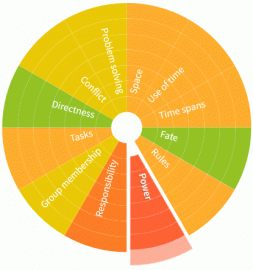Our cross-cultural experts have collected for you the top six ways to survive your first projects, collaborations and deals with other cultures.
Do your research and be ready for surprises
Find out about the culture. Use CultureConnector‘s cultural info pages to discover the essentials of business culture. See what are the top websites, books, celebrities, national heroes, festivals, sports. Read a novel or travel guide if you have time. No matter how much time you put into this, there is always a chance you’ll run into surprises. Try to connect these surprises with what you’ve learnt about the culture already. If it doesn’t seem to fit, ask your local contacts what’s behind the surprising behaviour.
Know the differences, find the common ground

Consider your own home culture and the comparison with the culture you’ll be working with, focusing on the points of greatest difference. Use CultureConnector to compare not only with foreign cultures, but your own culture too. The differences may be in power hierarchies or use of time or some other area. Give attention to the differences between you at an individual level and the new culture. CultureConnector will help you find the biggest gaps. Clicking through your profile “wheel” will open up some practical ways to handle difference. Now look for common ground instead of gaps. Emphasise these areas when working together with the other culture.
Build your networks

Do you know someone from the culture? Use every connection to find out more in advance. When you are already in direct contact with the culture, make friends and deepen business relationships at an individual level as much as possible. Find common interests between you and your counterparts, whether related or unrelated to your work. Take every opportunity to connect, meet, discuss and share. If you have good relationships with a person or team from the culture, connect with them in CultureConnector too. When you hit moments of uncertainty or confusion, people in your networks will help you understand what’s going on, or even offer you practical help.
Have a plan
Use the strategies that you get in your CultureConnector profile to plan your work with the other culture. Study these personal strategies carefully, they are designed for you. Make yourself a checklist of actions which are not part of your normal way of working; it could be about food or drink, family, meeting format, presentation style. Make an effort to implement the parts of your plan that are easiest for you to adapt to and those which you believe will be most appreciated by the other culture.
Don’t give up
Your normal techniques probably do not work, so be ready to try plans B and C. Give yourself some extra time. Look for examples of success with the new culture and consider whether you could apply those approaches in your work too. Be kind to yourself when you make a mistake, and try again with a different approach. Focus your attention on what is working. There will be problems, yet make sure you credit yourself for what you have achieved. Stay positive. Check CultureConnector’s pages about the culture for a selection of successful behaviours.
Re-think your criteria for success
Is your normal measure of success still relevant in this case? For example, if you think that you are completing the work on time, think again. Is your measure of success the warmth of the relationship? Or is the measure about the profit you’ve made in the short term? Whether you’ve reached a point of straight-talking? Take a step back and think what your criteria for success with this new culture should be. Focus on small steps, as long as they are in the right direction. Intercultural success often comes in small packages.
